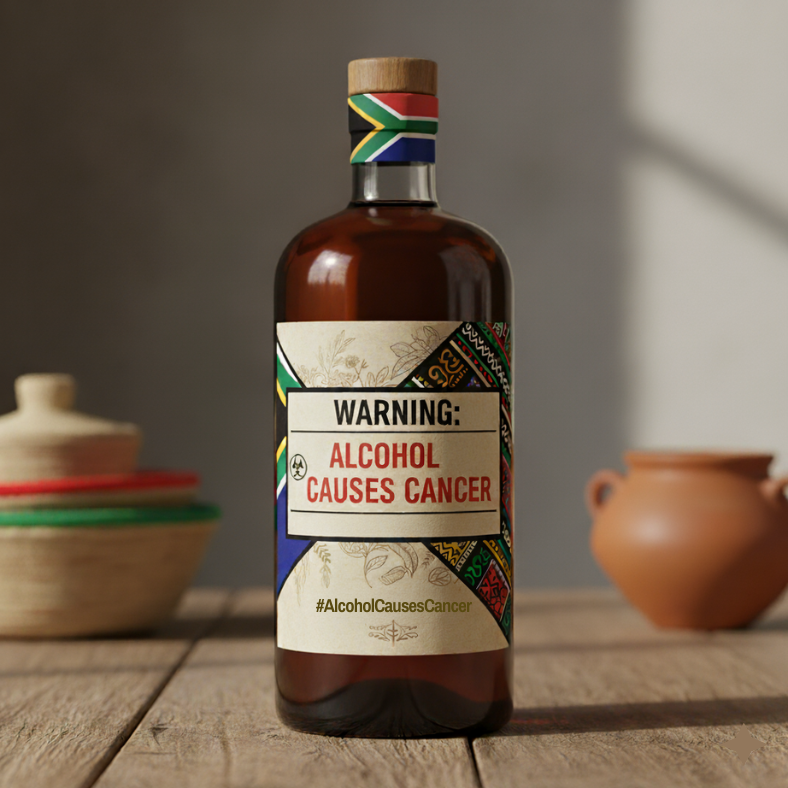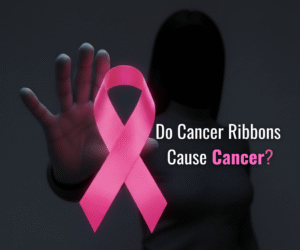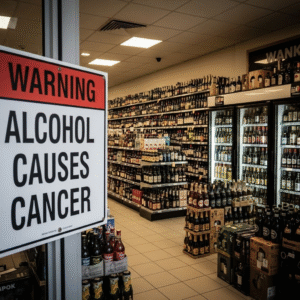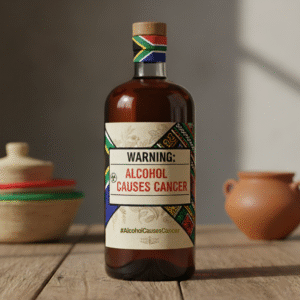South Africans Deserve the Truth About Alcohol and Cancer

Share #AlcoholCausesCancer
Why South Africans Deserve the Full Truth About Alcohol and Cancer
If you pick up a bottle of single malt whisky or a beautiful, botanical craft gin in South Africa today, what does the label celebrate? Heritage, craftsmanship, botanicals, and an entire aspirational lifestyle. It whispers of success, sophistication, and being the social lubricant essential to a life well-lived. Now, ask yourself, why does it remain silent on one crucial, undeniable fact?
I was telling everybody a while ago about an important article I wrote for Business Live, titled What’s Your Poison? The premise is simple, yet profoundly challenging to the liquor industry status quo: we need mandatory alcohol warning labels on every bottle, can, and box across the country, warning people that alcohol causes cancer.
My own research, drawing on well-established statistics from the Cancer Alliance and the World Health Organisation, has consistently shown that consumption—whether you consider it moderate or heavy—unambiguously increases the risk of multiple cancers. When you compare this to the graphic, unavoidable warnings on tobacco, the silence on liquor labels is not merely an oversight; it’s a deliberate, multi-billion rand omission. We, at JoziStyle, maintain that South Africans deserve to be informed, especially since the industry is certainly not in the business of full disclosure. It is time for a reality check on liquor legislation and the comfortable lies we have all been told.
The Cancer Risk: Beyond the Myth of Moderation
We are a nation steeped in the tradition of everything in moderation, a philosophical cornerstone that conveniently excuses a host of personal indulgences. When it comes to the link between alcohol and cancer, however, that phrase is simply not applicable. The uncomfortable truth, which leading professionals agree upon, is that there is no safe level of alcohol consumption.
My personal interest in this area comes from a critical analysis of current lifestyle choices and the profound lack of transparency in consumer information. I am not a prohibitionist; I am the first person to admit I enjoy the occasional glass or two myself. To suggest everyone should stop drinking would sound a little bit sanctimonious coming from me. However, I am an informed consumer, and I believe everyone is entitled to the same luxury of being fully informed before making a choice that carries inherent consequences.
The Problem with ‘Moderation’
The industry narrative has long focused on responsible drinking, but this deliberately conflates social behaviour with biological risk. The reality, backed by available data, is that the maximum amount of alcohol you should drink a week is a minuscule 15 millilitres. That is barely anything. The notion that “everything in moderation” is a legitimate defence against the known carcinogenic properties of alcohol is, frankly, a bit of a lie.
Alcohol has a ricochet effect throughout your body. We need only look at the trajectory of tobacco to see how far off the pace the alcohol industry is. At one point, cigarettes were promoted as an appetite suppressant, a nerve soother, and were even recommended for pregnant women. We look at that now and ask: how far have we come? When you look at a bottle of whisky, it celebrates the single malt and the heritage; it doesn’t tell you it causes throat cancer. When you look at a bottle of fashionable craft gin, it boasts about the botanicals; it doesn’t talk about breast tumours. Why should alcohol be treated differently when the cancer risk is virtually identical?
Addressing Label Blindness: The Universal Icon Solution
One of the most frequent counter-arguments to mandatory warnings is the phenomenon of label blindness. As a former smoker—I bought myself a box of cigarettes when I was one—I can attest that I never read those labels and eventually became blind to the warnings. We quickly learn to get the wrapper off.
This means a simple text warning on a bottle of South African wine or a can of local beer is not enough. We need to make people rethink their choices through a design-led, universally understandable approach.
The Proposal: A Non-Verbal Health Icon
For the labels to be truly effective, they must be redesigned. Critically, we must be mindful that we cannot always print every warning in every single language, especially in South Africa.
My novel, practical idea, which demonstrates a deep understanding of our unique local complexities, is that all alcohol manufacturers should have a universally recognised hazard warning, a bold, clear health icon.
This non-verbal, instantly recognisable graphic would immediately communicate that the substance is problematic, regardless of what language the person speaks or reads. This simple measure would cut through the literacy barrier and ensure that the health consequences are communicated instantly, forcing a pause in the consumer’s decision-making process. This is not about the nanny state or prohibition; it is about providing the dignity of informed choice.
Banning the Aspiration, Not the Glass
The crux of the matter is the relentless, pervasive glamourisation of alcohol. While tobacco advertising is banned virtually everywhere, the alcohol advertising industry continues to sell a compelling fantasy: that their product is essential to success, aspirational, and covetable. It is entrenched in our social DNA.
Even in biblical times, when people were consuming alcohol, there was a vast difference: the wine was consistently diluted by as much as ten times. They were essentially drinking a spritzer. It was considered positively barbarian to drink it undiluted. The alcohol wasn’t necessarily weaker than what we produce today, but the consumption method was fundamentally different.
The modern industry sells an escape from life, not a celebration of it.
Practical Shifts and Personal Responsibility
I am not naive enough to believe that everybody is going to suddenly stop drinking. Nor would I suggest it. But the point of the warning is to inspire conscious shifts. It is about educating people from a young age about the consequences and the importance of drinking responsibly, if they choose to drink at all.
For me, for example, the awareness means that perhaps instead of having two drinks in rapid succession, I will stagger them with a glass of water. Maybe I will eat more conscientiously, making sure I am not drinking on an empty stomach. The label is a seed of doubt; it is a reference point that forces an individual to pay attention to hydration with more urgency than just as an afterthought.
The fight is to ban the glamour, not the glass. The shift in focus from consumer abstinence to industry accountability is what establishes the authoritativeness and expertise of this commentary.
The Creative Call to Arms: Microplastics and Melodies
To ensure this serious message permeates popular culture, I’ve used my creative voice to make it memorable. You can follow me on Instagram and the JoziStyle blog where I have shared my songwriting efforts. I wrote an up-tempo disco number called Alcohol Causes Cancer, Baby. The message is true, but the music has groove. I took the uncompromising hashtag—Alcohol Causes Cancer—and put a jingle to it, because a serious message doesn’t have to sound like a long, drawn-out ballad.
I’ve also shared a song called Microplastic Cancer Bomb, inspired by the frightening reality that microplastic is now everywhere: in our food, water, and even in our bodily fluids. The title itself—Micro vs. Bomb and Plastic vs Cancer—is a powerful juxtaposition: small cause, big consequence and cause and consequence.
These projects are an extension of the same argument for total transparency. The way to fight pervasive lifestyle marketing is with creative, memorable consumer information that cuts through the noise and gets stuck in people’s heads.
The Final Reckoning
This is not about being a nanny, telling you what you should or should not do. You are entitled to live your life as you choose. But you also deserve to be fully informed of all the consequences. Putting clear alcohol warning labels on liquor products will not kill the liquor industry; it will save lives by ensuring people are informed about the consequences of their choices. The moral obligation for transparency is non-negotiable.
What are your thoughts on alcohol advertising in South Africa?
Subscribe to JoziStyle, follow us online, and listen to us on air.
Read and share the article I wrote for Business Live: What’s Your Poison?




